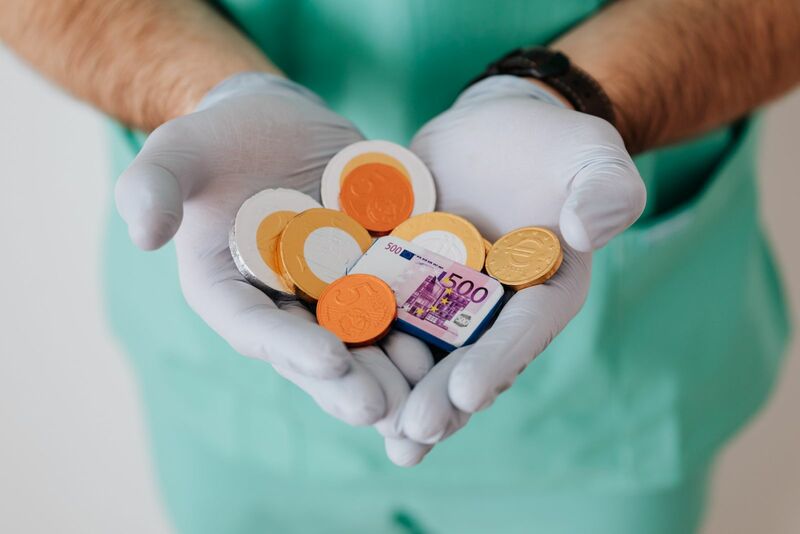
Healthcare—like utilities and consumer essentials—is a critical, non-negotiable need for everyday living. As such, companies operating in the sphere offer products and services that are in high demand year-round.
Unsurprisingly, most healthcare companies offer dividend payouts. With the opportunity to participate in potentially lucrative returns as medical technology advances, healthcare stocks can be very attractive to income investors.
So, let’s take a look at three healthcare stocks that offer high yields.
How I Screed For The Following Stocks
While everyone should be meticulous when doing their due diligence, there’s no reason not to make market analysis easier for yourself. That’s why I love features like Barchart’s Watchlist. Let me show you how easily I screened for these three healthcare stocks.
First, I opened my pre-prepared “Healthcare Stocks watchlist,” which includes various information at a glance, like last ex-dividend payment dates, payout ratios, and dividend yields.
So, with the watchlist ready, I simply clicked on the Div Yield column header to arrange the stocks based on yields in descending order, and voila.
So, let’s discuss the top three high-yield healthcare stocks, starting from highest to lowest yields, and see if they are as attractive as their dividends indicate.
Pfizer (PFE)
At the heart of the biopharma industry, Pfizer is changing healthcare through science-based innovation. The company's focus on research and development has resulted in breakthrough medicines that tackle the world's biggest health problems.
Pfizer's Biopharma segment, which includes the Oncology, U.S. Commercial, and International Commercial divisions, offers modern treatments in various medical fields. The company's product line includes medicines like Ibrance, Eliquis, Comirnaty, and Paxlovid.
In terms of financials, Pfizer reported a decline in Q1'24. The company’s total revenue decreased 20% YOY, and its net income also dropped 44%, lowering its quarterly EPS to 82 cents.
Even with the challenging quarter, Pfizer affirmed its FY’24 revenue guidance between $58.5 and $61.5 billion. Additionally, the company has announced a 42-cent quarterly payout, which translates to a $1.68 annual dividend rate and a 5.99% yield. However, based on the latest annual filings, the company does have a high 114.12% dividend payout ratio. Payout ratios over 60% tend to make me think about the company's prospects of growing it, or even cutting the dividend - so investors might want to keep that in mind when buying PFE stock.
Bristol-Myers Squibb Company (BMY)
Another biopharmaceutical company is Bristol-Myers Squibb Company. The company develops medicines that help patients recover from various diseases worldwide. Bristol-Myers Squibb's portfolio includes various therapeutic areas: oncology, hematology, immunology, cardiovascular, and neuroscience.
The business’s pipeline features promising candidates like Krazati, MRTX1719, RYZ101, KarXT, ORM-6151, and Repotrectinib. This alone shows the company's commitment to technological advancements.
However, for Q1'24, Bristol-Myers Squibb's financials presented mixed outcomes. Although its revenue increased to $11.87 billion from $11.34 billion in the same quarter last year, its net income took a hit, declining to a loss of $11.91 billion from a profit of $2.262 billion.
The company pays 60 cents per quarter or $2.40 annually, representing a 5.57% yield on BMY stock. While that might sound great, like Pfizer, Bristol-Myers Squibb has an alarming 199.94% dividend payout ratio.
Organon & Co. (OGN)
The last healthcare company for this analysis, but surely not the least in the field, is Organon & Co. This company offers various products focusing on key areas like women's health, biosimilars, and well-known brands. In addition, Organon & Co. has various birth control and fertility brands like Nexplanon and Follistim AQ. With several factories worldwide, Organon & Co. distributes its products through various channels.
The company and its subsidiary, Organon Foreign Debt Co-Issuer B.V., recently issued $1 billion in senior notes due 2034. The net proceeds will repay some of their borrowings under the company's senior credit facilities. The Notes, which will be guaranteed by Organon's existing subsidiaries that guarantee the debt under its senior credit facilities, are offered only to qualified buyers in the U.S. and to non-retail investors outside the country.
Looking at Organon's Q1'24 financial release, their performance showcased strengths in major metrics. Revenue increased by 5% YOY to $1.62 billion, and quarterly EPS rose by 13%.
Organon & Co. currently pays a 28-cent quarterly dividend, representing $1.12 annually and an impressive 5.52% yield. Furthermore, of the three companies on this list, only Organon & Co. has a low payout ratio of 27.27%, making it a good option for healthcare dividend stock enthusiasts.
Final Thoughts
Like I always say, high yields aren’t everything. Always look at the bigger picture and don’t neglect to dive into specific financial metrics to see if a particular stock is worth a buy.
On the date of publication, Rick Orford did not have (either directly or indirectly) positions in any of the securities mentioned in this article. All information and data in this article is solely for informational purposes. For more information please view the Barchart Disclosure Policy here.






